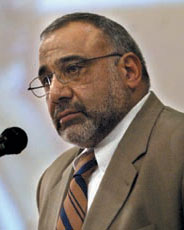 |
| Adil Abdul Mahdi |
Seeking forgiveness of Saddam-era debt
Litigation risk for years to come
Is any of Iraq's sovereign debt odious debt that can or should be repudiated entirely?
Iraq's need for very substantial debt relief derives from the economic realities facing a post-conflict country that has endured decades of financial corruption and mismanagement under the Saddam regime.
Principles of public international law such as the odious debt doctrine, whatever their legal vitality, are not the reason why Iraq is seeking this relief.
Is the interim government planning to restructure Iraq's sovereign debt now that the UN Security Council has given you the express authority to do so?
Restructuring Iraq's external debt is a very high priority of the interim government. UN Security Council Resolution No 1546 of June 8 2004 specifically encourages the interim government and Iraq's creditors to get on with this task.
What percentage of Iraq's oil revenues would be a reasonable amount to spend on foreign debt service in the future? Do you expect that number to increase over time?
Iraq must rebuild its civil infrastructure, including the oil sector, virtually from the ground up.